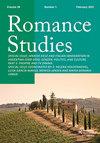When Julia Met Jaufre: Encounters with Troubadour Lyric in the Work of Julia Kristeva
IF 0.2
3区 文学
0 LITERATURE, ROMANCE
引用次数: 0
Abstract
ABSTRACT This article analyses the role of troubadour lyric in the psychoanalytic theory of Julia Kristeva, particularly her models of the semiotic, the objet a, and the abject. This objective necessarily involves an investigation of her relationship with Lacanian psychoanalysis, and often entails the palimpsestic project of reading Kristeva, reading Lacan, reading troubadour lyric. However, rather than simply documenting the instances of Kristeva’s engagement with lyric, the article expands the textual corpus beyond the lyrics analysed by Lacan and Kristeva in order to outline various ways in which the three textual corpora might illuminate, critique, and speak (back) to each other. The first section suggests that the works of Jaufre Rudel and Raimbaut de Vaqueiras, poets neglected by Kristeva and Lacan, might offer certain compromises between the two theorists on the subject of the semiotic. Focussing on the Thing and objet a, the second section formulates readings of a lyric by Bernart de Ventadorn, exploring ways in which Kristeva’s work might be seen to converge and diverge with both Lacanian and feminist reading practices. The article’s final part argues that the lyrics of the trobairitz suggest new, feminist possibilities for the abject.《当茱莉亚遇见乔弗尔:在茱莉亚·克里斯蒂娃的作品中遇到吟游诗人的抒情》
摘要本文分析了游吟诗人抒情诗在朱莉娅·克里斯特娃精神分析理论中的作用,特别是她的符号、客体和卑鄙的模型。这一目标必然涉及到对她与拉康精神分析的关系的调查,并且经常涉及到阅读克里斯特娃、阅读拉康、阅读游吟诗人歌词的重写项目。然而,这篇文章并不是简单地记录Kristeva参与歌词创作的例子,而是将文本语料库扩展到Lacan和Kristeva分析的歌词之外,以概述三个文本语料库可能相互阐明、批评和说话(反驳)的各种方式。第一部分认为,被克里斯特瓦和拉康忽视的诗人Jaufre Rudel和Raimbaut de Vaqueiras的作品可能为两位理论家在符号学问题上提供了某种妥协。第二节聚焦于事物和客体,阐述了对Bernart de Ventadorn的一首歌词的解读,探讨了Kristeva的作品与拉康主义和女权主义阅读实践的融合和分歧。文章的最后一部分认为,trobairitz的歌词为穷人提供了新的女权主义可能性。
本文章由计算机程序翻译,如有差异,请以英文原文为准。
求助全文
约1分钟内获得全文
求助全文

 求助内容:
求助内容: 应助结果提醒方式:
应助结果提醒方式:


